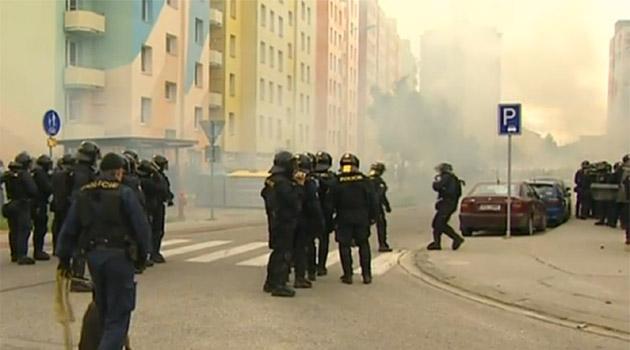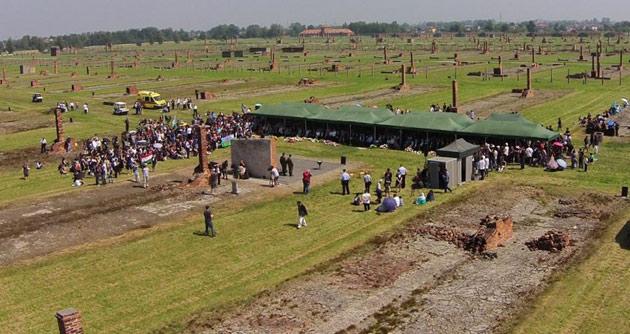Commentary: A children's playground, common dialogue, and the media

In mid-September the Lidové noviny daily paper opened up an important topic by publishing a sketch of an everyday experience at a children’s playground in the Czech Republic. What followed was a passionate discussion about whether the article itself was inciting racism or whether it was analyzing the causes of racism, whether a person should “speak up” in certain situations or leave them in tears.
It reminded me of a story that news server Romea.cz reported on, for example, here. For the time being that story has yet to be fully told.
The violent unrest at the Máj housing estate in České Budějovice during the summer of 2013 was initiated by a banal dispute at a playground. On 21 June, two boys aged three and five-and-a-half pushed each other in the sandbox.
Instead of the people in charge of the children calmly talking the situation out, the 17-year-old “white” sister of one boy lit into the “black” mother of the other boy. They began to physically fight one another furiously until gradually their partners and relatives joined in and a “big melee” began during which nobody ever asked who had started it.
A police patrol immediately arrived at the scene and was afraid to intervene. By the time backup arrived 20 minutes later, it was all over.
On the Internet an avalanche of reports broke out about a racist assault on a playground. During the three summer months, many protest actions were convened in response that were attended by several thousand embittered citizens.
A total of nine police officers were injured during those protests, at least one of them severely. In connection with the unrest, police reported arresting 224 people and charging 48 of them, most of them for attacking a police officer.
Indictments were handed down in 34 of those cases and the court sentenced 23 persons, most of them to suspended sentences. Dozens of other cases were dealt with as misdemeanor offenses.
Most of those convicted had no prior criminal record, according to Josef Richter, who was the state prosecutor for České Budějovice at the time. The initial dispute at the children’s playground also eventually came before the court.
Of course, the hearing of that case took place at a time when local media had stopped taking any interest in the entire subject. Six people indicted for battery and rioting were given suspended sentences for their violence last year.
Those convicted included the minor “white” girl who was both drunk and pregnant at the time she committed her crime. The most severe punishment was handed down against Tomáš Doul, her partner, who was 20 years old at the time and shares her skin color, for battery, making threats under the influence of intoxicants, property damage, rioting, and violence against police officers at demonstrations.
According to the court, it was Doul who launched a racist hoax on the Internet just after he had attacked a Romani woman who had nothing to do with the incident. Even though his Facebook page shows a tendency to Nazism, the local news server with the telling name of “Budějovická drbna” (Budějovice Gossip) began to spread his rumor that Romani people had assaulted “our” (i.e., a white Czech) pregnant girl.
When the local criminal police obfuscated the details, the nationwide media took the local news item as valid, disseminated it urgently – and then everything took off.
The painstaking work by detectives aiming to unravel the root cause of the massive street ruckus ultimately resulted in a declaration by the court that it had not ever been about racism.
Judge Irena Tichá told the courtroom that police had managed to ascertain who started the brawl. During a time of exacerbated antigypsyism fed by media hunger for sensationalistic news, two women’s nerves just cracked.
Each protagonist in the case appealed the first-instance verdict. In mid-October last year the Regional Court decided to uphold it and it has since taken effect.
It has been calm at the Máj housing estate for quite some time now. That has been achieved by the work of seven Romani police officers, a newly-built “multicultural” community center for recreational activities, field workers and volunteers.
There is still a lot of work to do, as the peace that has been established is fragile. Sometimes all it takes is a spark in the form of a well-coded message, or some clumsy words by a Government minister during an election campaign, and things begin to take off once more.
Whoever doesn’t want to experience such massive battles between otherwise unimpeachable citizens and the police in this country ever again should go learn the lesson of the Máj housing estate. When racism is addressed by a rational local politician with the support of the state, when there is mutual dialogue between citizens together with a careful investigative process by the media, then children of all skin colors will be able to play together nicely on the playground again.
